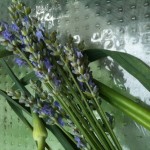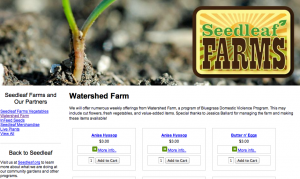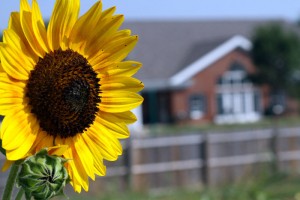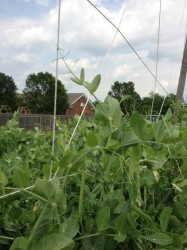This article appears on page 5 of the June 14 print edition of Ace Weekly.
BY KAKIE URCH
At Watershed Farm, sustainability of the herbs, flowers, and berries grown for online ordering means more than just sustainability in the physical environment.
The farm, about 40 acres in northeastern Fayette County, 10 miles from downtown, is operated by the Bluegrass Domestic Violence Program. Residential clients at the shelter on the farm help raise the crops — and the crops help raise them up, too.
“I am seeing a lot more ownership of the space. There’s a lot more pride, there’s a lot more confidence, there’s a lot more teamwork and less isolation,” said Diane Fleet, Assistant Director of the program that serves 17 counties surrounding Lexington. Currently, there are about 51 clients in residence at the farm.
”]

The Bluegrass Domestic Violence Program first moved to the farm in 2005 and rented. In 2007, Fleet said, the program entered into a long-term agreement for its shelter. “We just had so much land. We were like ‘What are we going to do with it?’ And we thought, ‘Why not just farm it?’ “
Fleet said that the BDVP got together with Jim Embry and some people from University of Kentucky agriculture to brainstorm how to use the land best to provide produce for food for the residents and how to develop a niche for its products.
Through that collaboration, the farm teamed with Jessica Ballard, a 2009 graduate of UK’s Sustainable Agriculture program.
Ballard, who also works with Seedleaf, Lexington’s urban farming project, grew up in

She said she works with clients who want to participate in the farming program in a number of different ways.
“I just try to grow a pretty well-rounded variety of basic vegetables, different fruits and berries, flowers and different herbs. Different clients resonate with different aspects. We’re not just trying to engage people who want to work in the garden growing food. We can get people who are into crafts and they can do crafts with herbs from the garden. We have people who are into cooking. When you’re harvesting to feed 40 people, washing the produce is important. If we can find a way to engage people with what their interests are, that is what we do.”
***
BDVP is a non-profit that is part of the Coalition of the Kentucky Domestic Violence Project. It serves the Bluegrass region development district of 17 counties, with a 24-hour crisis line, an emergency 32-bed shelter, court advocacy, support groups and education awareness. The residential shelter at the farm is for females. But BDVP partners with other groups to provide residential services for men who are victims of abuse.
Fleet says that the confidence and responsibility that clients get from participating on in the farm project fits with the group’s mission to “move people from crisis to self-sufficiency.”
“I want to introduce our clients to the Earth and to the garden. And that may be much less productive in growing produce, but it’s far more productive in introducing someone to good food,” Ballard said.
Other programs offered to clients include financial literacy classes, housing, assistance with establishing first month’s rent and utilities. BDVP has been providing these services since about 2004. The YWCA used to have the spouse abuse center, but it closed, Fleet said. Community groups got together to ensure that BDVP opened the day after the YWCA shelter closed, so there was no interruption of help for clients. BDVP has a staff of about 20.
The farming project has received help from a $25,000 grant from the Berea-based Grow Appalachia project, a grant from the United Way to look at health benefits, a donation of $5,000 from the Junior League, and donations from a number of area churches.
Proceeds from the sales of the online-ordered herbs, flowers and other products go to support BDVP.
Fleet said, “Our raspberries are coming in really soon. Our bees are hopping. We have two active hives and we are shooting for ten.”

“I’m hoping that cut flowers is a good fit for us. Our ladies really like to work with those. We have a lot of annuals like zinnias and straw flowers, certainly sunflowers, but a lot of native stuff like cone flowers, bee balm, black-eyed susans. It’s abundant and colorful,” Ballard said.
At Watershed Farm, they’re not just growing herbs, flowers, lettuce, berries and honey. They are growing a new self-sustainability, too.
“I do see when we really get in the zone, when the farm’s really cranking….I’m finding that there’s a lot more energy around. People are wanting to be involved in that rather than sit around. It’s a self-sufficiency piece. It’s being part of something bigger than yourself. You can’t just be in your head,” Ballard said.
YOU MIGHT ALSO LIKE
This Year’s Models 2009: Seedleaf’s Becca Self Ace December 2009
Lexington Grows: Community Gardens by Jim Embry Ace July 15, 2009 “This year we have had the divine blessing to be involved with these new gardens: Bluegrass Domestic Violence Program with the keen leadership from Diane Fleet has developed a small garden and has their sights on cultivating their 40 acres into a working farm with edible orchards, greenhouses, animals and much more…”
Visit Lexington’s Community Gardens Ace July 2008
Jim Embry is This Year’s Model, Ace December 2007










